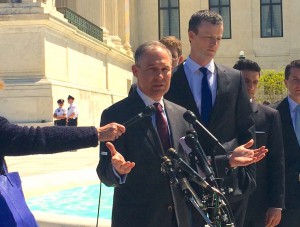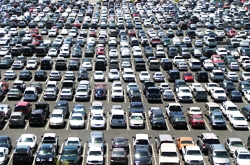The California Air Resources Board claims that the world’s carmakers already have the technology required to meet tighter emission standards for the 2022–2025 model year mandate as the state’s residents acquire 1 million more “zero” emission vehicles.
“The recent Detroit auto show shined a spotlight on the fact that we are fully engaged in a global transformation towards autonomous vehicles, with hybrid cars an industry norm and electric models appearing across models and platforms,” said CARB Chair Mary D. Nichols.
“Our standards need to recognize and keep pace with that market reality to keep California and the nation fully competitive in the global automobile marketplace. The conclusion is inescapable: California’s vehicle future is electric,” Nichols said.
The board’s finding set up a potential clash with the Trump administration, where climate change skeptics are expected to take charge of policy making at the U.S. Environmental Protection Agency.
(Trump to meet with Detroit CEOs on Tuesday. Click Here for details.)
The report from CARB noted, “The most exhaustive evaluation to date of the California passenger vehicle market and technology finds that the greenhouse gas emission standards currently in place for model years 2022-2025 are readily feasible at or below the costs estimated back in 2012 – when the standards were adopted with support from many automakers.

CARB is likely going to have to wrestle with Scott Pruitt, President Trump's choice to head the EPA, when it comes to its ability to make its own emissions rules.
“Continuing on the path to meeting the 2025 standards will deliver significant clean-air and public health benefits for Californians and cost-savings for consumers,” said the report from CARB, the tough-minded and controversial agency charged with protecting the air quality in California, which has also expanded its mandate to slow the pace of climate change.
As with conventional cars, zero-emission vehicle technology is advancing at a much faster pace than anticipated. California has more than a quarter-million ZEVs on the road. Worldwide there are now more than 2 million of these vehicles, and the market is growing.
Virtually every major automaker now produces or has in development at least one zero-emission vehicle model. December 2016 sales of zero-emission cars in the U.S. exceeded previous monthly highs, the CARB report said.
“In the next few years, the zero-emission market will see more than 20 new electric and plug-in model introductions. Many future offerings will have greater driving range – more than 200 miles – at mass-market prices and provide consumers with more choices of body styles, brands, and consumer utility, including SUVs and cross-overs,” the report added.
The 667-page Midterm Review of Advanced Clean Cars Program report released by CARB said that the previously adopted package of greenhouse gas standards, technology-forcing zero-emission vehicle standards, and the most health-protective particulate matter standards in the world are appropriate.
(For more on the EPA’s mileage decision, Click Here.)
The report also indicates that existing programs in California will add at least 1 million zero-emission vehicles, which are widely understood to be battery electric vehicles oe plug-in hybrids, on its roads and highways by 2025, the report noted.
In addition to its vehicle greenhouse gas and zero-emission vehicle rules, California, with nearly half of all zero-emission vehicles in the nation, “has several programs in place to further support the growing electric car marketplace.”
The state currently offers rebates to new buyers or lessees of zero-emission vehicles, is developing an initial hydrogen fueling infrastructure to support fuel cell electric vehicles, and agencies are pursuing nearly 200 actions to support the market for EVs.
California is also pushing to trim the generation of electricity from oil or coal fired power plants by broadenng the use of renewable energy from wind and solar power.
The California mandate, along with pressure from China where authorities are pushing development of electric vehilces, arethe key reason why automakers such as Ford Motor Co., BMW, Mercedes-Benz, Hyundai, Nissan and Mercedes-Benz and Fiat Chrysler have committed to bringing a new generation of battery electric vehicles to market by the end of the decade.
The new Trump team at EPA, however, has indicated it will attempt to roll back the California regulations on greenhouse gasses.
CARB also noted that when it adopted the Advanced Clean Cars standards in 2012, the agency committed to a comprehensive midterm review of the zero-emission vehicle regulation, the 1 milligram per mile particulate matter standard, and the light-duty vehicle greenhouse gas standards for 2022 and later model years.
(Trump nominates Oklahoma AG to head EPA. Click Here for details.)
The light-duty vehicle greenhouse gas standards for 2022 through 2025 model years was also conducted at the national level by CARB with help from the EPA and the National Highway Traffic Safety Administration.


Time to roll out the 200mpg carburetor again.
I would trust the automakers will keep developing engines that meet EPA standards set before Trump. The automakers should make a mutual agreement not to go backwards.
Here you raise an interesting point, Dan…
Corp. data show that even with the shift from passenger cars to light trucks, Americans continue to demand better mileage. Indeed, U-Mich studies show that while average fuel economy of new vehicles may have slipped over the last 2 years, it is so marginal as to be almost a rounding era, in the tenth-or-two range, not the big drop we saw in decades past when trucks first started gaining momentum.
So, while automakers might use a CAFE rollback or repeal to SLOW the race, I doubt we’d see fuel economy go stagnant was it did from the mid-1980s through the latter days of W’s administration. We’d likely still see more PHEVs and high-mileage EVs, though slower growth. We’d still have 700-hp Dodge Hellcats with big V-8s, but even there, a shift to more electrified performance vehicles.
Meanwhile, the industry would remain on competitive edge because everyone knows that should a Toyota — or a little Mazda, for that matter — find a way to make an OP-E or an HCCI engine work competitively (including cost, performance emissions — and lots more mileage) that maker would clean up. And there are a number of promising technologies on the way.
I am not saying that CAFE — or some effective alternative — is unnecessary, nor am I saying mileage would increase as quickly. But I don’t believe we’d see fuel economy gains halt, never mind a wholesale retreat.
Oh, and one reason? The rest of the world will continue moving in the same direction as before. It will become harder — and less and less cost effective — for makers to ignore mileage just for the U.S. going forward.
Paul E.